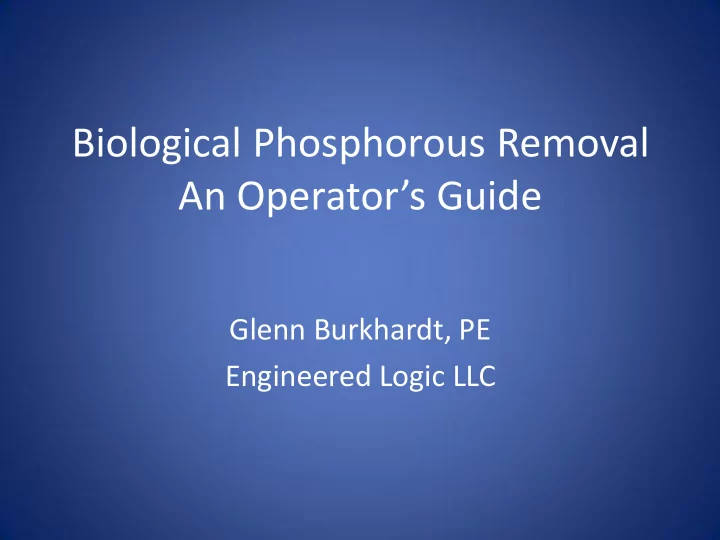

Biological Phosphorous Removal An Operator’s Guide Glenn Burkhardt, PE Engineered Logic LLC
What is Bio P Removal? • It is NOT a mysterious brown box
Bio P Model • Two Step Process (Anaerobic then Aerobic) Acetate + Poly- P → PHA + ATP → H20 + CO2 ← Anaerobic → ← Aerobic →
Bio P Process Discussion • Anaerobic Step • Carbon Conversion to Volatile Fatty Acids • Volatile Fatty Acid Conversion to Acetate • Acetate & Poly-P Conversion to PHA & ATP PHA Polyhydroxyalkanoic Acid ATP Adenosine Triphosphate • Aerobic Step • PHA & ATP Conversion to Glycogen, H2O & CO2
Phosphorous Uptake Diagram Anaerobic→← Aerobic 60 50 40 30 20 10 0 0 25 50 75 100 150 200 300
Treatment Process Diagram • A/O Process
Anoxic Zone
Aerobic Zone
Important Design Parameters • BOD to P ratio > 20 • COD to P ratio > 45 • VFA to P ratio > 7 • Anaerobic HRT 1 to 2 hours • Aerobic SRT 15 to 20 days • Nitrate Loading < O2 Demand of Waste
Important Operating Parameters • Anaerobic Zone pH 8.0 to 8.5 • Anaerobic Zone ORP -100 to -200 mV • Aerobic Zone pH 7.0 to 7.5 • Aerobic Zone ORP +100 to +300 mV • Return Sludge Rate Manage ML Conc. Maintain ORP Limits
pH and ORP Monitoring
Bio P Troubleshooting • Phosphorous Increasing (normal NH3 & SS) • P uptake could be due to low VFA production • ATP production could be affected by anaerobic pH • Nitrates could be affecting anaerobic conditions • Parameters to Check • VFA to P ratio (greater than 7) • Anaerobic reactor pH (8.0 to 8.5) • Anaerobic reactor ORP (-100 to -200 mV)
Bio P Troubleshooting • Rapid P Increase (normal NH3 & SS) • Side Stream with High P Being Introduced • P Release from Clarifier Sludge Blanket • P Release from High Solids Retention time • Parameters to Check • P Concentration to Anaerobic Reactor • ORP of Sludge Blanket ( 0 to 100 mV is the goal ) • Soluble P of Mixed Liquor ( < 0.5 mg/l is the goal )
Bio P Troubleshooting • High Effluent P ( high effluent SS) • Could be due to High Effluent Solids • Could be due to P Release • Could be due to Aerobic Reactor pH • Parameters to Check • Check P of Filtered Effluent Sample • Check P Profile of Anaerobic and Aerobic Reactors • Check pH of Anaerobic and Aerobic Reactors
Bio P Performance • Improved Solids Settling Characteristics • Less Risk of Aerobic Reactor Foaming • More Stable Under Shock Loading Conditions • No Chemicals Required • Less Sludge Production • Effluent P Typically 0.2 to 0.5 mg/l • Effluent NH3 Typically < 0.5 mg/l
Questions? Glenn Burkhardt, PE Engineered Logic LLC
Recommend
More recommend